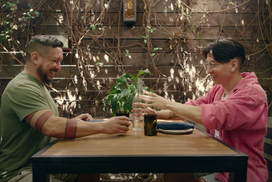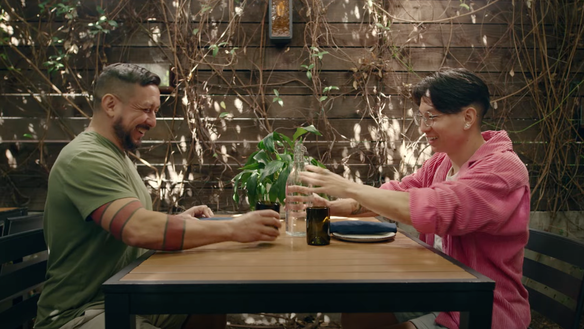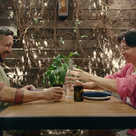Transcript
Dan Davidson: Our shift of mindset on growth became less of like, let's go build more business. It was, let's go build more impact.
Maynard Okereke: My name is Maynard and I am the creator of Hiphop Science, and I am also a co-founder of Jada Brands.
Dan Davidson: I'm Dan Davidson, founder of Rosebud Coffee and executive director of Coffee with a Cause.
Maynard Okereke: How's it going today, man?
Dan Davidson: Good. Doing well.
Maynard Okereke: I'm excited to learn, excited, learn everything about what you're doing.
Dan Davidson: Yeah, so I have a business called Rosebud Coffee, and my social mission is I work with youth that are transitioning out of the foster system or homelessness, and then I bring them in to train them in coffee and help them find coffee jobs.
Maynard Okereke: Oh that's amazing.
Dan Davidson: And then along the way, I also have a nonprofit and then nonprofits called Coffee with a Cause. I actually came out here to start a church, but the first people that I encountered actually were youth that were sleeping in the church parking lot that I came to start. Like any entrepreneur you work with what you get. I'm sitting here in this old church building with this old coffee cart. So what I ended up doing was finding some baristas in our neighborhood that could help us restart this coffee cart, getting up and running, and I began to pair the youth with these baristas, restarting the coffee cart, and that's kind of what kicked off our training program. And then it was eventually time to say, hey, let's do an actual coffee shop.
Maynard Okereke: For me, I work with youth a lot. My platform, hip hop science is all about sparking curiosity and encouraging more minority and youth involvement into the STEM fields. I have a background in stem. I studied civil environmental engineering at University of Washington in Seattle and worked in the industry for a number of years, and so I've always noticed a lack of minority involvement in STEM, and I always kind of felt pushed away from it. I originally wanted to study wildlife biology. That was my goal. I loved nature, I loved exploring outdoors, but I didn't really have any examples of what that could look like. And so I got just kind of talked out of it. That curiosity, the natural curiosity that I had for it was just kind of sucked out of me. Civil environmental engineering was kind of my compromise of, okay, I could still be in this kind of environmental ballpark, but I'm still into technology, still into all these other areas. Along with doing engineering and being kind of just a science nerd. I was always into music and entertainment. The arts was always something that I did, but I did it on the side. And then the hip hop science really just came in about a full combination of like, okay, I'm going to now put all my passions together so now I can be able to serve underrepresented communities. I'm going to create this fun social content that's going to be engaging. And through my representation, I can be able to show a new face of science. But I
Dan Davidson: Also saw you have a food business too.
Maynard Okereke: Yeah, food business just started out as my friend came up to me with an idea, and for me I was like, this sounds fun, this sounds different. But I was like, yeah, let's run with it. And we went from the ground level making the project ourselves eventually gone on Shark Tank.
Dan Davidson: Did the Sharks spike? What happened?
Maynard Okereke: We did a deal with Barbara on the show, which was amazing. Awesome. And so we've been scaling and growing the business ever since. And so people always ask now, how do you balance this and how do you leverage them together? And it's different both kind of in different fields, but for me, I talk a lot about the entrepreneurship that work that I do in my food business when I talk to students when I do outreach, because one of the things about empowering students is showcasing you don't have to be one thing. I try to showcase. You can be multi-talented into all sorts of different things. That right there helps spark that curiosity.
Dan Davidson: There's a pattern here that we both fell into or that sense of, you see a need, you see this problem, and then you start working with the larger community to meet that need using the resource you have. I then started partnering with local nonprofits because when I realized the youth homelessness way beyond my capacity, these other nonprofits are providing case management and housing and help for education.
Maynard Okereke: Well, how do you set up those partnerships? How do you join forces?
Dan Davidson: It's just going to the nonprofit and saying, I'm building this out. I think this would be a great partnership. And they said, yeah, absolutely.
Maynard Okereke: You have like-minded goals.
Dan Davidson: Exactly, yeah. Because in fact, we're helping them achieve their goals. They have certain expectations they're trying to meet, and so us coming alongside to provide the job training and employment is furthering them as well as furthering us.
Maynard Okereke: So if you're partnering with all these nonprofits that aren't necessarily known for bringing in money and then you're now doing this positive work for the community, how do you translate that into the scalability of the business and the work that you do?
Dan Davidson: I made a decision early on to go and start a business, not start a nonprofit, so that the work with the youth could stay a labor of love. It could just evolve naturally. But then you get to a place like we are now, which is to say, well, we want to grow. And so after Covid began, we set up this nonprofit and that's the opportunity we saw as best fit for the growth that we want to see happen. So instead of us wanting to go out and start more Rosebud Coffees on the corner, we've got plenty of coffee shops out there. It's to take the model of training, the work that we do with the youth into small businesses. And that's hopefully now going to kickstart the nonprofit growth through grants.
Maynard Okereke: Interesting.
Dan Davidson: So now we can be able to hopefully connect with more youth, place 'em into new locations in our area and all of that administrative costs, the personnel costs that be funded by the grants. So our sense of shift of mindset on growth became less of like, let's go build more business. It was, let's go build more impact because we don't have to assume that small business owner doesn't want it to have impact. Because the aha was they do.
Maynard Okereke: And I think that's an area too that's really interesting from any social entrepreneurial business is now developing programs that can now transcend beyond your own business. So that's one area that even within the work that I do is trying to think, okay, what are ways that I can turn this into a program that can live beyond me? So that could be things like making products like STEM products, science kits, science experiment tools that could be delivered to through 12 classrooms that have this K-pop science theme.
Dan Davidson: Have you thought then on your end about adding also a nonprofit that would let you be able to take the ideas you're incubating and get them out there?
Maynard Okereke: That's exactly an area that I'm exploring right now, which is why it's great to hear how you transition into doing that, because that's an area I've been identifying and it's been on my radar. I just haven't really figured out a plan of how to be able to do it. If
Dan Davidson: You help me with social media, I'll help you with non-profit work. That would be fantastic. Oh my gosh.
Maynard Okereke: Now we're in this social space where we are doing all this advocacy work, we're doing all these things that it's very impactful, but then you have this whole business structure that you have to maintain around it, and it's like how do you continuously cycle things through where this work can continue to prosper?
Dan Davidson: Yeah. I don't know how it's been on your experience, but I think too, what comes to mind is the power of social capital. We are a part of this much larger community, and so there's been at times for sure, where I feel like we just needed to tap our friends, our family, our supporters, and say, Hey, can you help us do this? So I remember raising my first round of funds for getting the coffee shop open and just telling the community like, Hey, we're ready to make this transition. Can you support us? Can you help us raise the funds to do it? And you're always kind of surprised that there'll be this resounding yes. Yeah, we'll help you like, wow, awesome.
Maynard Okereke: Well, interesting you bring that up, right? Because you talked about earlier your social media. That's an area that you struggle, right? And you can gain social capital through social media.
Dan Davidson: Absolutely. Absolutely.
Maynard Okereke: What have you been trying to do now to better yourself within that space?
Dan Davidson: That's hard to answer
Maynard Okereke: Because I guess I come from my perspective, my mind started as this building that social capital, doing my work on social media and understanding how to leverage social media to be able to open the doors for new opportunities so you're able to gain social capital by having a social media presence and showcase that.
Dan Davidson: A hundred percent agree. That's the area of opportunity. The story we have and the experience we have locally has been awesome and super connected, super supported. We're at a place, I think with our new nonprofit and the work we've done to go to another level, we really can't get and bridge to that next level without social media. And when you're looking at the different tools out there, as you mentioned for social media, I mean, what technologies or platforms are you utilizing the most?
Maynard Okereke: You have to look at social media as a tool, and that's what it is. It is just another tool within the framework of your business that you have to be able to utilize. You use this tool now to be able to build your social capital and showcase what you're doing.
Dan Davidson: Which platform or technology should I pick up and start utilizing as a tool?
Maynard Okereke: First thing I always built out was my website and one, showcasing what my business is about and why people need to be a partnered with this, but then also making it a transactional tool, a way to be able to easily get bookings for people to be able to now connect with you. That's where even things that we do with utilizing Square come into play, right? Because you're able to have all these unique integrations with your platforms, so you're able to make transactions easier. So once you now do that, you're able to now expand that into whatever social platforms that you want to focus on and dial in on, and then continue to bring that story to the table, and then that helps build that social presence. So now when you're reaching out to other nonprofit organizations, they're able to see the work that you're doing and why it's important.
Dan Davidson: It is hard being a social entrepreneur. It's hard holding the double bottom line, but I think our world, I think our nation needs it. I think we need new models that represent how we can do economics, how we can do business different.
Maynard Okereke: I also firmly believe that. Just thinking about a world where every business had a social responsibility in line with it, you think about how many transformative things we can do right on every level with all these problems that we have that can be solved if everybody came with that social purpose.
Dan Davidson: I love that because all of us as entrepreneurs have things we're very passionate about, and it's just that wake up, don't turn that off when you go to work, don't turn off the social concern you have when you're building your business. Of course, you've got to work on the sustainability and the profitability and all of that, but also say yes to what your heart is open to. I think my first takeaway is just being encouraged by another social entrepreneur, knowing that there's others out there that are finding ways for their business, their passion to have a social impact. That's super, just encouraging for me.
Maynard Okereke: I would say the biggest takeaway was really at the core, the value and the importance of social entrepreneurship work. And then also just seeing how he was able to leverage his work into the nonprofit sector and all that was really inspiring.







